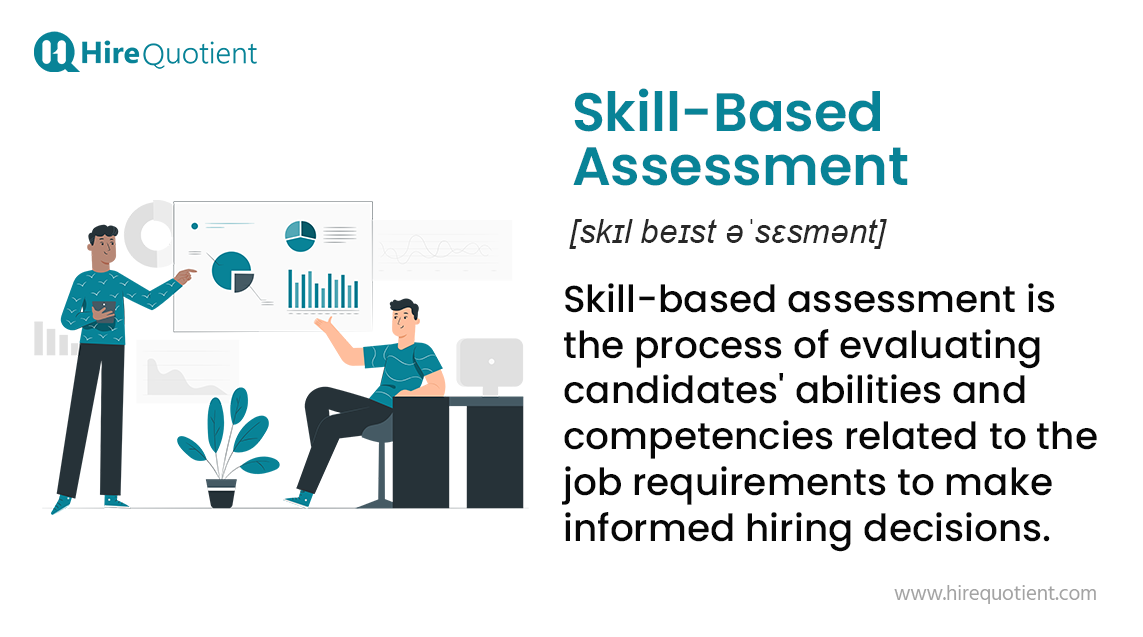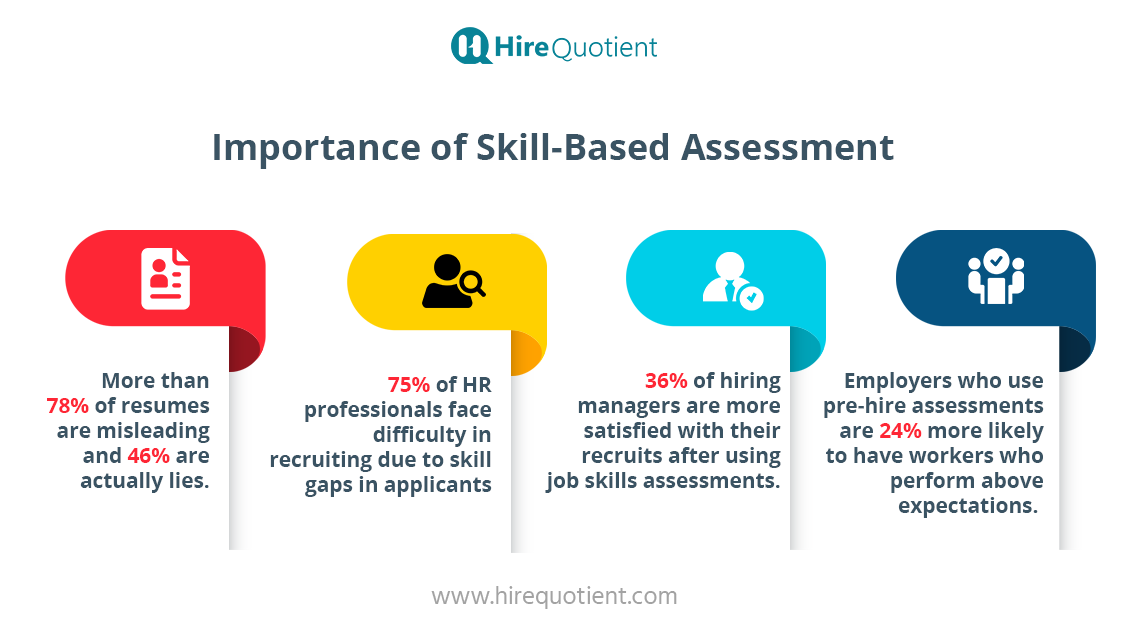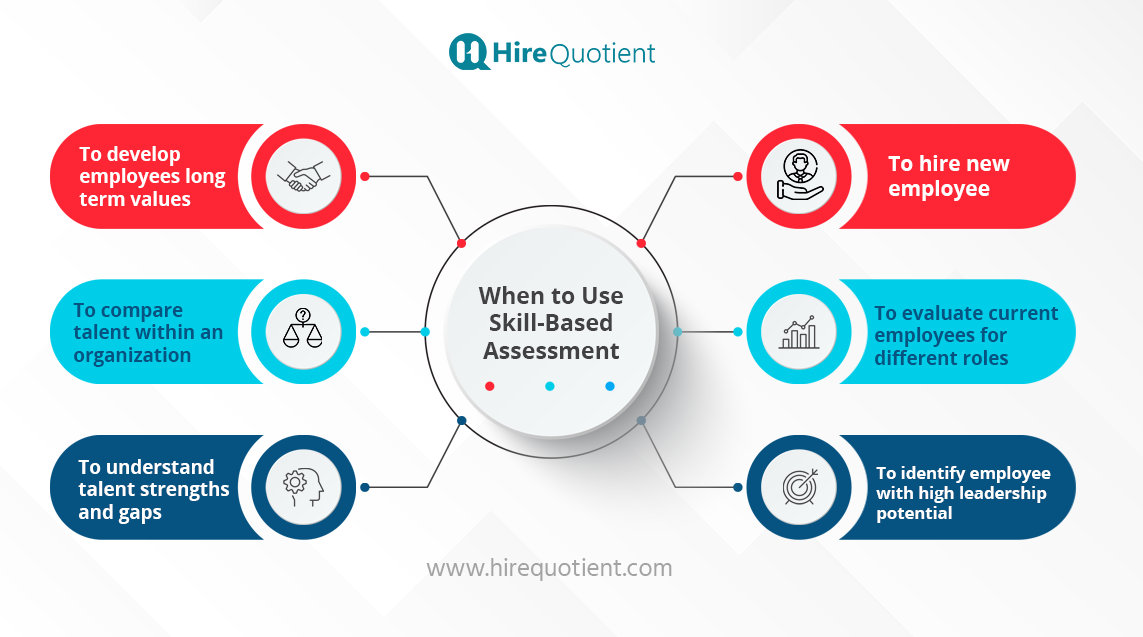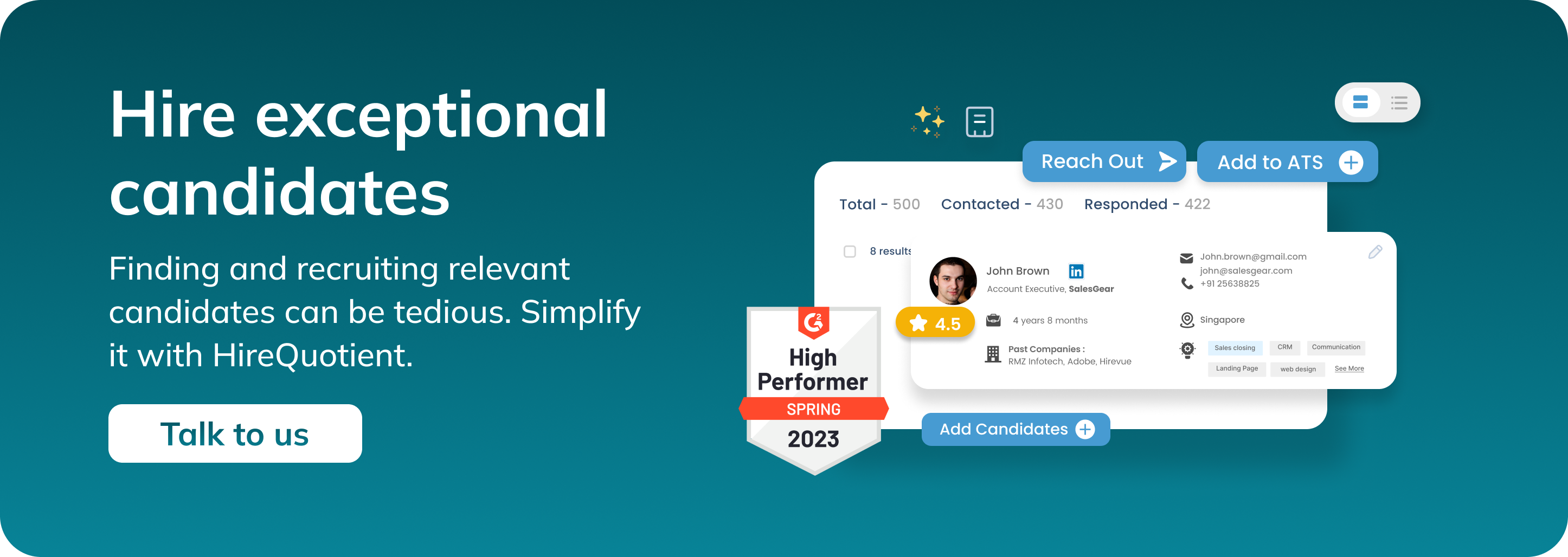What is a skill based assessment test for employment?
Online skill based assessment tests have created a buzz in the marketplace. Find out the what, why, how, types, and benefits of the platform to choose the best one for your organization.
Finding the perfect candidate for your job role is like looking for a needle in the haystack. With an average of 250 candidates applying for a single job role, the recruiters feel ambushed and often end up making the wrong hire.

Skill-based assessment is the platform that can help you liberate yourself from all such problems, redeem your time for more challenging tasks and help you to choose the right fit for your job role.
What is Skill Based Assessment?

A skill-based assessment is a series of tests designed to evaluate the skills of a candidate to determine if they are the perfect fit for your job role.
But what about CVs and resumes? Aren’t organizations supposed to judge and hire candidates on the basis of their career history and qualifications?
Yes and no! Yes to the fact that recruiters do assess candidates on the basis of their resume but the screening process doesn’t end here.
Consider this! The applicant has mentioned all top-tier qualities and skills in their CV but are they really adept with those qualities? Can you trust them based on a piece of paper?
No right! But if you conduct an employment skills assessment for the applicant you can be 100% sure that they have the required skills and can be a good fit for your job role.
And with the availability of such a wide library of assessment tools, you get a 360-degree profile of the candidate using these employee skills assessments.
The stats and figures confirm the same story:

- More than 78% of resumes are misleading and 46% are actually lies.
- 75% of HR professionals face difficulty in recruiting due to skill gaps in applicants.
- 36% of hiring managers are more satisfied with their recruits after using job skill assessments.
- Employers who use pre-hire assessments are 24% more likely to have workers who perform above expectations.
When to Use a Skills Assessment?
Some people are strong in education, others are rich in experience. A skills assessment test does not tell how or when the candidate learned the skills but measures what the applicant can do.
The idea of using skill-based assessment tests is not only limited to hiring, they can be used for in-house training and upskilling of the employees as well.
Hiring: a skill assessment test can be used to shortlist the candidate that perfectly fits your job role.
Learning & Development: a skills assessment test is a quick and unbiased checkpoint that can be used as employees move along a learning path to make sure the training is effective.
Reskilling and Upskilling: to manage the talent gap of current employees, companies are encouraging them to learn a related or new set of skills.
Read more: How does reskilling and upskilling help your organization grow?
Principles of skill assessment
Skill assessment is a critical process for evaluating an individual's proficiency and capabilities in a particular area. Whether it's for employment, education, or personal development, skill assessment should be based on sound principles to ensure fairness, accuracy and effectiveness. Here are some key principles of skill assessment:
- Validity: The assessment must measure what it intends to assess accurately. It should be aligned with the specific skills or competencies in question.
- Reliability: The assessment should yield consistent results when administered multiple times or by different assessors. Inconsistent or unreliable assessments can lead to unreliable decisions.
- Fairness: The assessment should be free from bias or discrimination. It should not disadvantage any individual or group based on characteristics such as gender, race, or background.
- Transparency: The assessment process and criteria should be clear and transparent to both the assessor and the assessed. Individuals should understand what is being assessed and how it will be evaluated.
- Standardization: A standardized assessment has consistent procedures and scoring criteria. This helps ensure fairness and comparability across different individuals or groups.
- Objectivity: The assessment should minimize subjectivity in scoring or interpretation. Clear and objective criteria for evaluation should be established.
- Appropriateness: The assessment method and content should be appropriate for the skill or competency being assessed. It should also be appropriate for the context in which it is used.
- Practicality: The assessment should be feasible to administer, in terms of time, resources, and logistics. It should not be overly burdensome for the assessors or the individuals being assessed.
- Feedback: Provide constructive feedback to individuals after the assessment. Feedback can help individuals understand their strengths and areas for improvement.
- Continuous Improvement: Assessments should be periodically reviewed and updated to ensure they remain relevant and effective. Feedback from assessors and those being assessed can inform improvements.
- Ethical Considerations: Ensure that the assessment process adheres to ethical guidelines and principles. Protect the privacy and confidentiality of individuals being assessed.
- Usefulness: The results of the assessment should have practical utility. They should assist in making informed decisions, whether in hiring, education, or personal development.
- Customization: Depending on the purpose and context, assessments may need to be customized or tailored to specific skills or competencies.
- Multiple Data Sources: Use multiple sources of data when possible, such as interviews, practical tests, and self-assessments, to gain a more comprehensive view of an individual's skills.
- Continuous Learning: Encourage a culture of continuous learning and skill development. Assessments should not be solely punitive but should also support growth and development.
These principles can guide the design and implementation of effective skill assessments in various contexts, ensuring that assessments are reliable, fair, and valuable for both individuals and organizations.
Types of skill assessment
Skills are a veritable commodity for both hiring and development. Skill assessment tests measure the length and breadth of a candidate’s knowledge and skills and their likelihood of succeeding at work.
To test the all-round abilities and skills of an applicant, the following types of skill assessments can be employed:
Psychometric Tests: Psychometric tests are psychological evaluation tools conducted to objectively assess a candidate’s aptitude, personality traits, abilities, and intelligence levels. Whether for employment or career guidance, the psychometric test can help match an individual’s personality and abilities to the right role or career.
Behavioral Tests: Behavioral tests are structured frameworks to assess candidates’ behavioral competencies in a simulated work environment. Individuals taking these assessments demonstrate their behavioral skills in tasks that mimic actual workplace settings. Behavioral assessments are a crucial part of the evaluation process that aims to observe, understand, analyze, predict, or even rectify the candidates’ behaviors.
Coding Tests: Coding tests are technical skills assessments that tech recruiters can use to single out suitable coders with the desired skills. These online skill assessments for hiring filter out unsuitable candidates early in the tech process, ensuring only the most competent professionals get to the next level. Using these technical skills tests, employers can easily assess the coding prowess of job applicants.
Aptitude Tests: Aptitude tests are standardized pre-employment assessments that help employers determine an individual’s fitment for a role. These tools are an excellent way for recruiters to understand how applicants might tackle the challenges of the role for which they have applied, uncovering their strengths and weaknesses.
Domain Tests: Domain tests, also known as technical tests, are structured assessments administered to candidates (for technical and non-technical profiles) to evaluate their domain knowledge and aptitude required for the given roles. Such a skills test helps determine suitable candidates by placing probabilities in strict test environments to gauge whether they possess the knowledge and skills required for the position.
Communication skills Tests: Communication skills assessments evaluate the candidates’ communication skills and focus on how well they understand the complexities of the language. These tests are broadly based on four evaluation parameters: pronunciation, fluency, listening comprehension, and grammar.
Benefits of assessment for hiring
Reduced Bias and Discrimination: Bias based on race, age, gender, and affinity may creep along during the hiring process unconsciously because after all, we are just humans. However, skill-based assessment tests act as a neutral impersonal funnel that turns its back to any bias and filters applicants only on the basis of skill and abilities.
Accelerates the Hiring Process: Employing skill-based assessments accelerates the hiring process because the recruiters don't have to sit poring through the resumes and their interviews to shortlist candidates. The tool prepares a graded list with the best-fit applicants on the top.
Gives Consistency: Skill-based assessments test each candidate with the same level of questions and tasks which is nearly impossible during human interviews. This instills a sense of consistency in the entire recruitment process.
Learning & Development: Skill-based assessments have been really useful in pinpointing the skill gaps of employees, making it easier to develop a relevant, personalized learning and development plan.
Skill assessment tests vs. other assessment methods / Skill tests vs. interviewing
Employers conduct competency-based skills assessments to make the right hiring decisions. Some of the most common methods of assessing candidates’ or existing employees’ skills are resume reviews, interviews, employment tests, background investigations, etc.
However, there’s no match for high-precision skills assessment tests. These are standardized, scientific, and formal means of identifying high-potential employees and deserving candidates. Intrinsically, skills assessment tests ensure authentic scores, ratings, and grading of the candidate. Hence, these tests are prepared to evaluate the candidates’ skills and abilities comprehensively.
Skills assessments offer additional benefits over other assessment methods. For example, when evaluating through old-school testing methods, you cannot vouch for the candidates’ genuineness. The facts presented in resumes, job interviews, and reference checks can be misrepresented. Such misleading results can create a quandary for recruiters because candidates might portray themselves in the best light to grab the opportunity.
Skills tests are quite effective in predicting performance when compared to traditional interviews or CV screenings. The results derived from skills testing are objective, factually relevant, and crucial in selecting a candidate – whereas a CV is not enough to make a hiring decision. Candidates can present misleading information on their CVs but not on a skills test.
Hear it from the experts themselves, it has been touted that the skills assessment market which was valued at $1.93 bn is expected to grow at a compound annual growth rate of 11.6% and be valued at $5.64 bn by 2030.
What is the Purpose of a Skills Assessment?
Leveraging job skill assessment tests for applicants can be advantageous because you know only what they have written on their CVs, which is not enough. Testing applicants in real-life job simulations can bring out the best in them and help you in choosing the right fit for your role. This was one of the reasons why skills assessments are necessary. Other reasons include:
To know about the candidate’s actual skills: Resumes and CVs often list incomplete information which can be misleading for the employer. Conducting skill tests can authenticate the abilities that the candidate possesses.
Finding the right fit: Now that you know the abilities of your candidates, you can easily decide whether they are the perfect fit for your job role or not.
Assess candidates’ cultural fit: The candidate you choose might be sound in technical skills but if he cannot communicate well and remain on the same page as the rest of the team, he can feel disconnected. Skill tests enable recruiters to determine candidates' cultural fit competently and effectively.
Addresses high-volume hiring: Skills tests come in handy when hiring at scale. By using an employability skills assessment as a pre-screening tool, hiring managers can differentiate between ideal and incompatible candidates early on and save substantial time that would otherwise be wasted on interviewing unqualified candidates.
How common is skill assessment testing?
Though skill-based assessment tests have been in the market for quite some time, they started gaining popularity in recent years since the pandemic hit us.
The percentage of employers who use competency based skill assessment tools has grown tremendously and according to the recent Talent Board's Candidate Experience Research report, more than 82% of the companies are using the technology.
The skill assessment tools have become technologically and scientifically advanced and also pocket friendly which is an add-on for employers.
Another reason why so many employers use skill assessment tests these days is that they guarantee a great candidate experience. Candidates can access and solve these skill assessment tests online from their own living room, at the time that suits them the best.
Why do so many companies use skill assessment tests?
Skill assessment tools have become the most affordable, reliable, and objective method for assessing candidates, but they have additional benefits as well. Employers use the tools:

- To hire new employees,
- To evaluate current employees for different roles,
- To identify employees with high leadership potential,
- To compare talent within an organization against industry or geographical benchmarks,
- To understand talent strengths and gaps,
- To develop employees’ long-term value.
Skill assessment tests provide relevant information on both job applicants’ and employees’ ability to perform in the workplace.
As such, skill assessment tests are used by employers to make well-informed, data-backed decisions regarding recruitment, training, and promotion of job candidates and employees.
How to choose the right type of skill assessment test? What employers should look for when choosing skill testing software?
The features that you’re looking for in the skill assessment tool depend on the qualities the recruiter wishes to assess based on business objectives for that particular job.
Nonetheless, a recruiter should look for the following general features when choosing the skill testing software:
Ease of use The software should have a user-friendly interface so that it can assess a large pool of candidates quickly and should also have the option to customize the questionnaire and assessment tests.
Ease of operation The tool should allow candidates to be invited based on name, email address, and IP address and schedule dates and times as per the agreement with the candidate.
Foolproof testing process One of the greatest disadvantages that were pulling back online skill assessments was the lack of proctoring. Recruiters feared that the applicants would cheat easily and the whole process would have become unfair.
However, the tools have been upgraded now with great proctoring and anti-cheating features and you should pick the software that has the best security tools to ensure fair testing.
High ROI Picking any pre-employment skill assessment tool is going to cost a lot of money. You should make sure that the software you choose is rewarding in terms of reduced time to hire, increased hiring efficiency, and higher returns overall.
Apart from these features, there are a few questions you should ask before finalizing your skill assessment tool.
Does the assessment platform have its own library of tests? Any suitable assessment tool should have a vast assessment library. Be it a technical or a non-technical assessment platform, it should provide tests for every job role with full security and fairness.
Does the assessment platform allow you to customize tests? The assessment platform should allow customization of the tests they provide so you can design the assessment according to your needs.
Does the assessment platform offer superior candidate experience? A smooth candidate experience enables you to project a positive brand to your candidates and thereby elevate your standing as a preferred employer. Make sure that the platform you choose allows for a smooth test experience in spite of machine and internet issues. Ensure that you are able to keep the candidate engaged with timely interventions over email, phone, and chat.
Does the assessment platform give you detailed performance insights? Tests are of no use if your platform is not able to give you relevant insights into the candidate’s performance. Make sure that the platform you choose is able to give comparable feedback on the candidate’s performance across various relevant criteria.
Does the assessment platform comply with your security and compliance requirements? It would be prudent to make sure that the platform complies with the relevant data protection policies that you adhere to.
How Skill Testing Works
The best way to conduct skill testing is to craft the questions according to the role and needs of the team hiring the new candidate. When you sit down to design a skills test, keep in mind to combine questions that can get you an overall personality and answer to how the candidate will perform in different scenarios.
In the end, the best use of skills assessment tools is to help recruiters move away from the resumes and allow candidates to prove them in the real world. The recruiting team and the hiring team should collaborate to intricately craft the right series of questions to hire the right candidate.
How to Set Up and Run a Skill Test
While designing a skills test or pre-employment assessment, you can thoughtfully structure your questions by keeping a few things in mind.
Vervoe has recommended the best practices for setting up and running a skill test. These tips can help with candidate engagement and lead to high rates of completion.
- Include a minimum of six questions or go up to the range of eight to ten questions while designing your skills test.
- You can start with a text-based question at first and then go on to video and immersive questions.
- Have a mandatory immersive question where the candidate can work on a document, spreadsheet, or presentation.
- For a better candidate experience, start with easier questions and build up to more difficult ones later in the assessment.
- Minimize the use of timers and let the candidates get creative for a better chance of success.
Using Skill Tests During Hiring
Now that you know how to set up an assessment, when should you deploy this tool during the hiring process?
Timing is everything when it comes to adding a skill assessment to your hiring process.
Harvard Business Review suggests that skills tests should come at the start of the hiring process. They further added that many companies, call centers, and security firms conduct a small web-based test to weed out the least deserving applicants and leave a pool of better-qualified candidates.
Do new hires like doing skill tests?
In a LinkedIn report, it was found that 76% of professionals wished that there was a way for employers to verify their skills so they could stand out amongst other candidates.
By most accounts, candidates appreciate the opportunity to showcase what makes them great at their job.
People spend an average of 11 hours per week looking and applying for jobs. It starts to get very boring and ultimately every interview starts to look the same.
To break from the monotony, when candidates get the chance to showcase their talent through real-world tasks, they grab the opportunity to get engaged with the job opening and give their 100% to rise above the rest of the resumes.
Even if the candidate doesn’t get selected, they are eager for the chance to at least showcase their talent.
Do skill tests work?
According to us, skill testing definitely works better than traditional hiring methods - with some warning.
Without a doubt, aptitude tests can be used to replace resume screening. The old style of sorting through candidates increases the chance that the best candidates will be unfairly eliminated. Good people get screened out, rather than screened in. Resumes and cover letters are not indicative of job performance, yet they are often the basis on which candidates are judged.
Skills tests improve the time to hire while allowing the hiring manager to see how someone will do the job before they get the offer. This reduces turnover costs and the best candidate is recruited in less time and money. The best skills tests, however, need the right formula to help the candidates succeed. Some recruiters focus narrowly on the technical skills that will help a new hire succeed in the immediate position for which they are hiring. Yet, many HRs emphasize the importance of soft skills – things like leadership and teamwork.
Recruiters must integrate questions into their skill assessment that focus on critical soft skills as well as the technical or hard skills that predict long-term success.
Is skill testing valid?
A common concern among recruiters that have been floating around for quite some time is whether the skills assessment is valid.
- A test that mimics what a person will do on a job is fairly valid.
- Testing soft skills and personality traits are risky but fall in compliance with EEOC.
- Overall fairness and positive candidate experience are other two reasons why skill testing is an effective and valid method.
The Best skills assessment tools in the market
Skills assessment tools come with myriad features that can be administered quickly and easily through well-designed software.
Here is a list of the best skill assessment tools in the market.
HireQuotient HireQuotient is an emerging skills assessment platform that offers fuss-free hiring. They have a curated library that is stacked with e-books, case studies, industry papers, and templates for your reference.
On top of that, they provide free tools like candidate sourcing software - EasySource, JD generator and ROI calculator which is an excellent addon to their already amazing skill assessments.
Package-wise, they offer three subscriptions, emerging, growth, and rocketship; prices for which can be availed after taking their demo.
eSkill eSkill is an online skill assessment solution that helps organizations deploy the most accurate, valid tests for pre-employment and skills gap assessments. You can choose from over 600 standard tests, 5000 combinable topics, or create your own content for any job and industry.
Harver Harver is a full-suite candidate selection platform designed to enable innovative companies around the world to hire better and faster. By blending interactive assessments, predictive analytics, and workflow automation, Harver enables innovative companies to digitally transform their candidate selection process.
iMocha With iMocha, you can verify your candidate's job fit with our 2500+ skill tests, aptitude tests, and enterprise-ready assessment platform. You can choose from a vast library of pre-built skill tests, customize one yourself or order a custom-made test specially designed for you.
They offer a broad spectrum of talent analytics by extending their skill assessments for hiring and learning needs.
Codility Codility is a software platform that helps tech recruiters and hiring managers assess their candidates' skills by testing their code online. Codility generates automatically scored reports about each candidate's coding abilities, empowering the whole team to gauge technical skills.
Xobin Xobin is an online skill Assessment Platform enabling organizations to conduct Skills tests, Psychometric, and Coding Tests. Used by over 400+ teams for recruitment and training activities, Xobin serves as the world's largest white-collar skills testing platform.
Mercer Mettl Mercer Mettl is an online skill assessment platform that can help you measure your candidates’ skills, personality, and abilities. You can choose from their test library of the different psychometric, cognitive and technical tests or get custom tests built for your specific needs.
HackerEarth HackerEarth is the most comprehensive developer assessment software that helps companies to accurately measure the skills of developers during the recruiting process. More than 500 companies across the globe use HackerEarth to improve the quality of their engineering hires and reduce the time spent by recruiters on screening candidates.
Get started today!
Looking for a skills assessment platform for your business? Begin your customer experience journey with HireQuotient, an easy-to-use platform that’ll help you conduct skills assessments along with a free JD generator and ROI calculator tools. You can refer to our vast library of e-books, case studies, and industry papers and make the most out of them.
Built to cater to businesses of all sizes, you can choose from our flexible pricing plans to get the best for your company.
We want you to have the best experience too!

